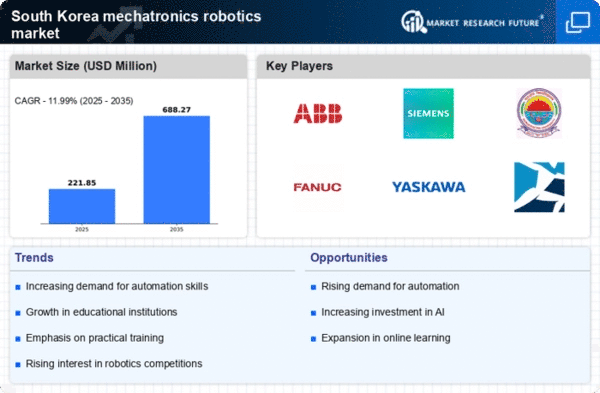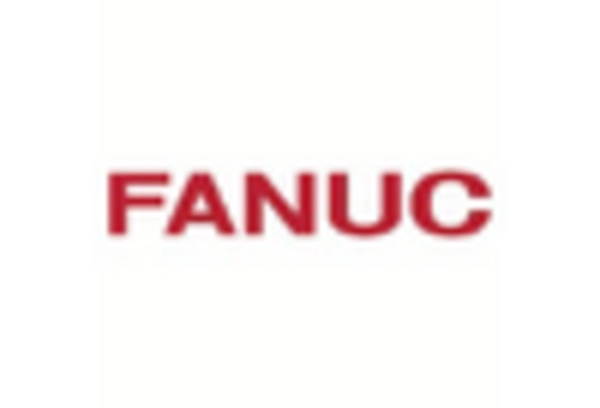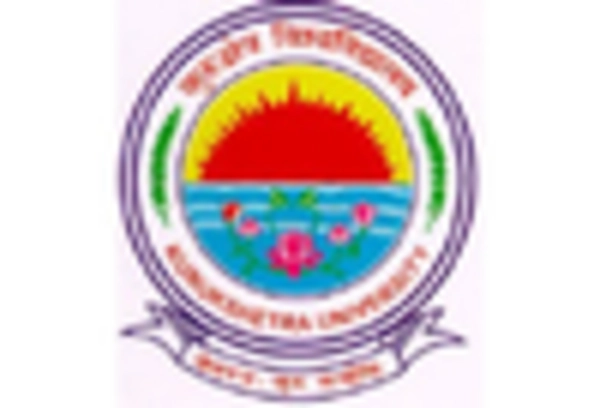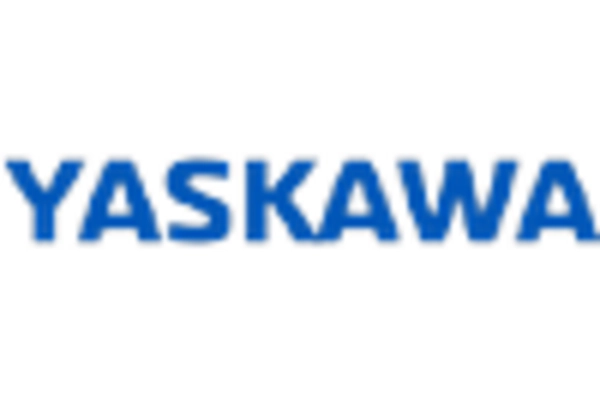Government Initiatives and Funding
Government initiatives play a crucial role in shaping the mechatronics robotics-courses market in South Korea. The government has recognized the importance of fostering innovation and technological advancement, leading to increased funding for educational programs in robotics and mechatronics. Recent reports indicate that public investment in STEM education has risen by 20% over the past year, aimed at enhancing the skill set of the workforce. This financial support not only facilitates the development of new courses but also encourages collaboration between educational institutions and industry leaders. As a result, the mechatronics robotics-courses market is likely to benefit from enhanced resources, improved infrastructure, and a more robust curriculum that meets the demands of a rapidly evolving technological landscape.
Industry-Specific Training Programs
The emergence of industry-specific training programs is reshaping the mechatronics robotics-courses market in South Korea. As various sectors, such as manufacturing, healthcare, and logistics, increasingly adopt robotics solutions, there is a growing need for tailored educational programs that address specific industry requirements. Recent surveys indicate that 70% of employers prefer candidates with specialized training in robotics relevant to their field. In response, educational institutions are collaborating with industry partners to develop customized courses that provide practical skills and knowledge. This trend not only enhances the employability of graduates but also strengthens the alignment between education and industry needs, thereby fostering growth in the mechatronics robotics-courses market.
Rising Demand for Automation Skills
The mechatronics robotics-courses market in South Korea is experiencing a notable surge in demand for automation skills. As industries increasingly adopt automation technologies, the need for skilled professionals proficient in mechatronics and robotics is becoming paramount. According to recent data, the automation sector is projected to grow by approximately 15% annually, driving educational institutions to enhance their course offerings. This trend indicates a shift towards integrating advanced robotics and mechatronics into the curriculum, ensuring that students are equipped with the necessary skills to meet industry requirements. Consequently, the mechatronics robotics-courses market is likely to expand, as educational providers respond to this growing demand by developing specialized programs that align with the evolving needs of the workforce.
Technological Advancements in Robotics
Technological advancements are significantly influencing the mechatronics robotics-courses market in South Korea. The rapid evolution of robotics technologies, including artificial intelligence, machine learning, and sensor technologies, necessitates continuous updates to educational curricula. Institutions are increasingly incorporating these advancements into their courses to ensure that students are well-versed in the latest developments. For instance, the integration of AI in robotics is expected to create new job opportunities, with estimates suggesting a potential increase of 30% in related employment by 2027. This dynamic environment compels educational providers to adapt their offerings, thereby driving growth in the mechatronics robotics-courses market as they strive to prepare students for future challenges.
Increased Focus on Research and Development
An increased focus on research and development (R&D) within the mechatronics robotics-courses market is evident in South Korea. Educational institutions are prioritizing R&D initiatives to advance knowledge and innovation in robotics and mechatronics. This emphasis on R&D is supported by partnerships with technology firms and research organizations, facilitating access to cutting-edge resources and expertise. Data suggests that R&D investment in the robotics sector has grown by 25% over the last two years, reflecting a commitment to fostering innovation. As a result, students enrolled in mechatronics robotics courses are likely to benefit from exposure to pioneering research projects, enhancing their learning experience and preparing them for future careers in a competitive job market.
















